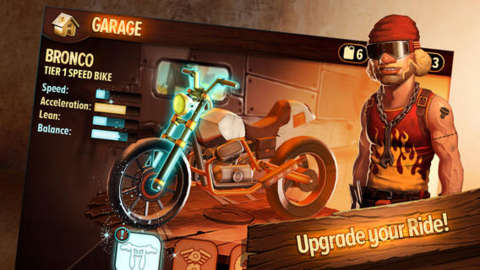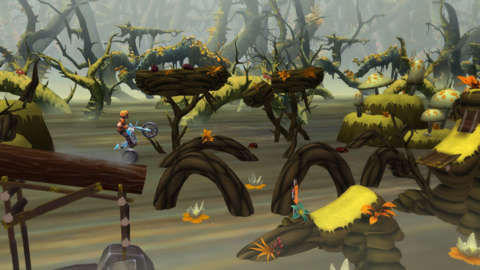Trials Frontier accomplishes something that I did not think possible: It miraculously brings the precise racing Trials is defined by to a touchscreen--albeit in a streamlined form--and offers a welcome alternative to the real thing when you're not in front of your television. And for the first half hour, I was tilting my rider through crazy obstacle courses on my way to racking up gold medals. It was only after I had been amazed by how much fun I was having that the door was shut in my face. The dark side of this free-to-play offering showed itself, and I stared at the screen, puzzled at this invasive pricing model, and how it has kept me from enjoying this mobile experience.
Although free-to-play business models have become an omnipresent way to rope people in on both mobile devices and PCs, I've somehow never been directly exposed to them. More by happenstance than conscious avoidance, my ignorance of this field has kept me out of the many debates that have sprung forth; I could only nod as voices rose and fell with each new outrage. After almost 30 years of buying games in the traditional way, I was used to those games being complete experiences, and Frontier introduced me to a style that was immediately off-putting. When engagement is difficult to obtain and so many pieces of entertainment are vying for my interest (and dollars), why, I wondered, would a developer choose to interrupt my enjoyment? Isn't the risk of alienation so strong that the developer would fear monetary prompts would push people away? I had no concrete answers, so I could only imagine the psychological cost of such endeavors.
Destiny 2: The Final Shape | Journey into The Traveler Trailer Metaphor: ReFantazio The King’s Trial Trailer Tales of the Shire - Official Announcement Trailer Dead Island 2 – Steam Launch Trailer Valheim: Ashlands - Official Gameplay Trailer Nickelodeon All-Star Brawl 2 - Official Zuko Gameplay Spotlight Trailer Fortnite Festival - Official Billie Eilish Cinematic Season 3 Trailer Remnant 2 - The Forgotten Kingdom | DLC Launch Trailer Stellar Blade - Official "The Journey: Part 2" Behind The Scenes Trailer | PS5 Games Starship Troopers: Extermination - Official "The New Vanguard" Update 0.7.0 Trailer Dead by Daylight | Tome 19: Splendor | Reveal Trailer 2XKO - Official Illaoi Champion Gameplay Reveal Trailer
Please enter your date of birth to view this video
By clicking 'enter', you agree to GameSpot's
Terms of Use and Privacy Policy
Frontier is not sleazy in the way it uses its free-to-play model. Completing races earns you items you use to upgrade your motorcycle, including money, gems, and parts. Such a system makes sense no matter which pricing scheme a game uses, but it's how Frontier manages its finite resources that pushed me away. You see, upgrading your bike takes time. In the beginning, I stayed in the shop for a few seconds as modifications were made. Then it went up to half a minute, half an hour, and then two hours. I could choose to speed up that time by spending my precious gems, but I chose to put my iPad down instead while I worked on other endeavors. And it's that action that has informed much of this editorial. Why would a developer purposefully include a system that could urge you to walk away, to enjoy something else while the game ticked away in the background?
And these delays aren't the only thing that irked me. After a little time playing Frontier, I had missions to track down specific parts. What started as a free-flowing, exciting racing game transformed into a tedious grind as I strove to gather every part that I needed. Parts are earned by spinning a wheel at the end of each race and hoping that you land on the right space. You can spin more than once if you spend your hard-earned gems, though I quickly went through my cache. Eventually, I ran out of gas, so I had to wait while my tank refilled. Every element of this game is conspiring to push me away. Given the choice, I would have paid a premium (say, $10) to play this game without the grind, but as it is, I want nothing more than to play Trials Fusion on the PlayStation 4 rather than spend another minute in Frontier's exploitative ecosystem.
Isn't the risk of alienation so strong that the developer would fear monetary prompts would push people away?
The world is filled with excellent games. And I do not use the word "excellent" lightly. Even if we focus on just the iPad--ignoring the dozen other devices out there--there have been a bounty of riches released in just the last couple of weeks. Hearthstone, Monument Valley, FTL: Faster Than Light, and Hitman Go are all fighting for people's attention, and winning that battle with ease. When there are so many alternatives out there, many of which either employ a F2P model (such as Hearthstone) or can be purchased for less than what your lunch costs (Monument Valley and Hitman Go are less than $10 combined), what would compel me to stick with Trials Frontier when I know that more breaks will interrupt any rhythm I've built?

There's a certain confidence that goes along with a free-to-play model. Or maybe it's cockiness. The model supposes that a certain number of people will be so enthralled by a game that they will ignore the barriers being constructed. It assumes that, for some people, any minor bump can be safely overlooked. I admire a team that could have such faith in what they've been working on, though it seems like a dangerous road to venture down. With Frontier, I need only exhibit a bit of patience and I can have fun without shelling out a dime, or just switch to another game or application while I wait for the upgrades to complete. But once I moved on to Faster Than Light, I became so invested in my space conquests that the act of digital motorcycling seemed dull. Frontier is fun, there's no doubt about that, but not fun enough that I can swallow what the developers have shoved on my plate. So they've pushed me away.
Not everyone feels the same way that I do. Free-to-play games have done a masterful job of destroying the initial barrier that could keep people from trying a game. By letting us test a game for no money, the developers open the door for more potential customers than those games that require an investment up front. However, getting people to play a game doesn't pay the bills. It's keeping them coming back that can be lucrative. So a free-to-play game has to be so good and so immediately captivating that not only will people continue playing, but they will eventually shell out money to keep the experience going. Even ad-supported games need to keep you coming back. That's a tall order, especially in a world filled with so many entertainment options. We know from a recent study that two-thirds of people stop playing free-to-play games less than 24 hours after they begin, and such a turnover is probably assumed before pricing models are set. Many of us are window shoppers, happy to look without buying, so it's no surprise that people would get a taste before moving on to something else.

The problem with Frontier was not just that it was asking for money, but how it did so. By halting my progress, the game held me captive. "Wait or pay," the game seemed to say to me. "It's your choice." But neither of those options was appealing. Waiting rubs me the wrong way because I wasn't interested in other activities. I wanted to play Frontier, and was prevented from doing so. But paying was just as ugly. I buy more games than I have time to play (mostly on the Vita), so rewarding developers for their hard work has become a decent part of my budget. But I need to know exactly how much I'm going to spend before it makes sense. With a traditional game, I shell out, say, $12, and know that I will never be asked to spend another cent. If I had relented with Frontier, I knew I would have faced a similar money-versus-time dilemma down the road, so I didn't want to spend any money.
In my eyes, free-to-play games can work only if payments are integrated seamlessly into the action without halting your fun. By letting you earn cards through payment or playing, Hearthstone is much less invasive. Or we could look at how Path of Exile gives you clothing options that have a purely visual impact. There are many acceptable approaches to free-to-play integration. It's when progress is stopped, that you have to waste time grinding or waiting for an arbitrary counter to tick down, that it's a problem. Competing for people's attention is one of the toughest things a creator has to deal with today. Don't make your lives harder by pushing people away.